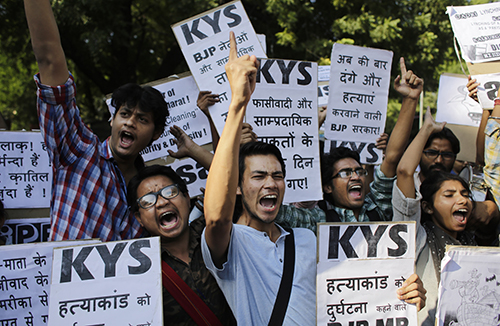The violence over the tightening of laws banning the consumption of beef in parts of India and debate over the reach of a right-wing Hindu agenda are having an impact on press freedom. An editor who wrote about the benefits of beef was fired last week, journalists have received death threats from extremist groups, and writers have handed back awards in protest of what they see as the government’s failure to address a rising tide of intolerance.
On Thursday, Devyani Singh, editor of Shiksha Saarthi, a bilingual magazine published in Hindi and English by the Haryana state education department, was fired by government officials. Singh published a piece in the September issue titled, “Iron-Vital for Strength” that merely listed beef and veal as being sources of iron, according to news reports. Copies of the magazine were recalled from schools and the online issue was removed from the elementary education department’s website. A copy was available on the website of the secondary education department, at the time of writing.
“Such an article should not have been published in a Haryana magazine. The editor of the magazine has given a justification that the article was based on scientific research and recommendations. We have relieved the editor from the post and further action would be taken in this concern,” the state’s Education Minister Ram Bilas Sharma told media. In a statement he said that anything that directly or indirectly “promotes” the consumption of beef would be prohibited in state-government publications.
CPJ contacted the editor, Singh, about the case but she has not yet responded.
Haryana is led by the right-wing ruling Bharatiya Janata Party (BJP) and is among the states that have recently tightened laws over the killing and consumption of cows, which are considered sacred by many Hindus. Violating the newly enacted state law can lead to 10 years in prison.
The religious ideology behind the ban has made the debate and passing of these laws in India, which is secular, a sensitive issue. In late September, a Muslim farm worker was killed by a Hindu mob who stormed his home and beat him and his family over rumors that they slaughtered and ate a calf, according to reports. The killing, which happened in Dadri, Uttar Pradesh state, just an hour’s drive from Delhi, made international headlines.
However, it’s not just these laws that have stirred controversy in Hindu-majority India. Many segments of Indian civil society believe a surge in violence by the Hindu-right is cause for alarm.
In September, I wrote about a series of death threats right-wing Hindu groups were making against journalists and writers including Nikhil Wagle, in Mumbai. Last month, journalism student Huchangi Prasad, who published Odala Kichu, a book about the oppression of lower caste Dalits, was attacked by a group of men who threatened to cut off his fingers for “anti-Hindu writing,” according to news reports. Prasad was able to escape, but said he was left with knife injuries to his palm.
More than 40 writers and 12 filmmakers have returned government awards in recent weeks in protest over what they say is growing intolerance under a right-wing led government. Last week, more than a dozen scientists and about 50 historians followed suit, with a statement from the scientists urging Indian President Pranab Mukerjee to address the intolerance that is “taking our country, which has a rich heritage and cultural diversity, backwards.”
The protest had been met with criticism, including from some columnists and politicians, who accused the awardees of double standards and of remaining silent during ethnic and religious-based violence that happened under previous governments.
Ruling parties in India have seldom been ardent champions of free speech, dissent, and tolerance, as CPJ has previously documented, but Prime Minister Narendra Modi, who came to power on a platform of moving India forward, must address these attacks and threats of violence if he is to avoid India going backwards.
